|
|
|
Sort Order |
|
|
|
Items / Page
|
|
|
|
|
|
|
| Srl | Item |
| 1 |
ID:
124113
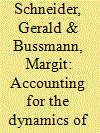

|
|
|
|
|
| Publication |
2013.
|
| Summary/Abstract |
This article presents the Konstanz One-Sided Violence Event Dataset (KOSVED) which allows researchers to study the dynamics of civilian abuse in 17 civil wars. The dataset provides, based on a multitude of sources, detailed information on the number of civilians killed or harmed by government or rebel troops. Where information is available, KOSVED also documents the dates of these events as well as the identities of the perpetrators and the means used in terrorizing the civilian population. The authors argue that the content analysis of news reports offers relatively accurate figures on those events that the perpetrators cannot hide from the public and that receive prominent media attention. Presumably, such information motivates potential short-term retaliatory acts by the group that has been the target of one-sided violence. The analysis suggests that, over the course of a conflict, almost all actors attack unarmed citizens, although to radically different degrees and relying on different means.
|
|
|
|
|
|
|
|
|
|
|
|
|
|
|
|
| 2 |
ID:
071890
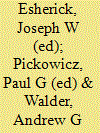

|
|
|
|
|
| Publication |
Stanford, Stanford University Press, 2006.
|
| Description |
x, 382p.hbk
|
| Series |
Shorenstein Asia-Pacific Research Center Series
|
| Standard Number |
0804753490
|
|
|
|
|
|
|
|
|
|
|
|
Copies: C:1/I:0,R:0,Q:0
Circulation
| Accession# | Call# | Current Location | Status | Policy | Location |
| 051277 | 951.056/ESH 051277 | Main | On Shelf | General | |
|
|
|
|
| 3 |
ID:
155000
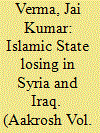

|
|
|
| 4 |
ID:
145752
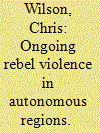

|
|
|
|
|
| Summary/Abstract |
In the large body of literature on the granting of regional autonomy to end insurgency, an important related question has received little attention: what happens to other ethnic groups within the autonomous region? The new arrangement may end violence between the state and the guerrillas but will the latter simply turn their guns on other groups in the area? This article begins to fill this gap in the literature through a close examination of two mass killings conducted by rebels awarded an autonomous region in western Assam, Northeast India. Why would these militants—having won such far-reaching political and economic rewards after a decade of civil war—continue violence and risk these hard-won gains? I propose that violence against other ethnic communities in the new region is more likely in the presence of two main conditions. First, when the community receiving autonomy is a minority in the new region, and second, when only one militant faction is awarded power.
|
|
|
|
|
|
|
|
|
|
|
|
|
|
|
|
| 5 |
ID:
141227
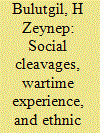

|
|
|
|
|
| Summary/Abstract |
What explains ethnic cleansing? Recent research has used systematic evidence to explore the causes of civilian victimization and mass killings. Yet, comparable studies that focus on ethnic cleansing are still rare. This article conceptualizes ethnic cleansing as a group-level phenomenon that is distinct from civilian victimization or mass killings and studies its causes by using systematic evidence from Europe 1900–2000. The article makes two theoretical moves. First, it highlights the salience of non-ethnic cleavages such as social class as a background condition that has the ability to hinder ethnic cleansing. Second, it distinguishes between two causal mechanisms, one that considers wars as ‘strategic environments’ and the other as ‘transformative experiences’, that relate to the proximate causes of ethnic cleansing. Using original data from 20th-century Europe, the empirical analysis offers two main findings. First, it shows that salient social cleavages, measured through levels of land inequality, political competition, and support for left-wing parties, substantially decrease the risk of ethnic cleansing. Second, the analysis suggests that the arguments that underscore psychological mechanisms related to wartime experiences provide a better explanation for ethnic cleansing than the arguments that emphasize the role of strategic wartime aims. This finding is further supported by a brief discussion of key cases in which both causal mechanisms predict ethnic cleansing. The results highlight the importance of treating ethnic cleansing as a conceptually separate phenomenon and offer implications for the debate on democracy and mass ethnic violence.
|
|
|
|
|
|
|
|
|
|
|
|
|
|
|
|
|
|
|
|
|